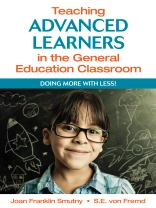Low-stress tips for challenging high-ability learners
Many teachers ask: ‘What do I do for students who finish their work before everyone else? Is there anything I can use that doesn′t require me to read a long textbook with complicated instructions?’ If you would like to do more for gifted students and need simple strategies that you can use tomorrow, this book is for you. Inside are helpful methods for challenging students who need more than the regular curriculum can provide. Readers will find practical tools, including:
- Tips for using existing resources and potential
- A progression from simpler to more complex adjustments for advanced learners
- Specific lessons for language arts, math, science, social studies, and the arts
The authors′ strategies can be tailored to benefit students of varying abilities. The lessons are easy to integrate, consistent with curriculum standards, and described in practical terms. You will also find ready-to-use reproducibles, helpful vignettes, and additional resources for differentiating instruction so that all students are challenged to reach their potential.
Table des matières
Acknowledgments
About the Authors
Introduction
1. Understanding Advanced Learners
2. Making the Most of Your Resources
3. Creating Appropriate Goals for Advanced Students
4. Meeting the Needs of Advanced Students: Strategies to Begin
5. Meeting the Needs of Advanced Students: Strategies to Extend Learning
6. Teaching Advanced Students in Language Arts and Social Studies
7. Teaching Advanced Students in Science and Mathematics
8. Keeping Yourself Inspired
Resources
References
Index
A propos de l’auteur
S.E. von Fremd is an independent scholar, writer, and editor with a background in education, cultural studies, and dance. She performed with the Never Stop Moving Dance Company in Chicago under the direction of Reynaldo Martinez and taught creative dance and theater to children in the city and surrounding areas. Her interest in creativity and culture eventually led her to do a doctorate in performance studies at Northwestern University. This included a year’s research in Uganda, where she focused on the role of popular theater and dance in reviving cultural identity and educating children and young people throughout the country. She has written several book reviews on African musical traditions, a monograph on the cultural legacy of Kenyan novelist Ngugi wa Thiong’o and Nigerian playwright Wole Soyinka, another monograph on refugees in Africa, and an article on the performing arts as a popular forum for education in Uganda. She has also given presentations on Uganda’s creative artists under the reign of Idi Amin and on dance movements throughout the continent of Africa.












